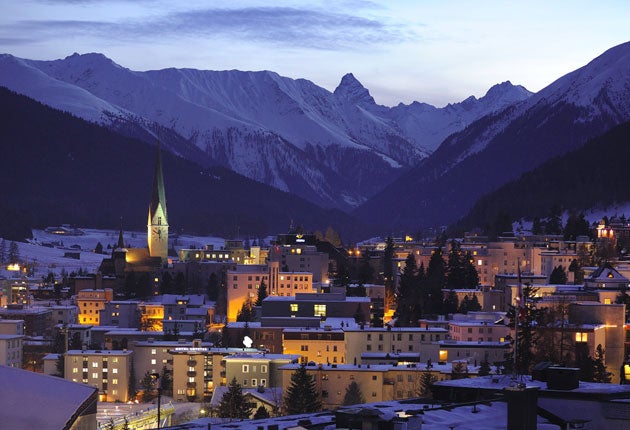Davos: The mountain resort where money talks
As the global business elite prepare for their annual gathering, Sean O'Grady and Poornuima Subrammaniam offer a guide to what Davos is really all aboutpresent a guide to the global summit

Your support helps us to tell the story
From reproductive rights to climate change to Big Tech, The Independent is on the ground when the story is developing. Whether it's investigating the financials of Elon Musk's pro-Trump PAC or producing our latest documentary, 'The A Word', which shines a light on the American women fighting for reproductive rights, we know how important it is to parse out the facts from the messaging.
At such a critical moment in US history, we need reporters on the ground. Your donation allows us to keep sending journalists to speak to both sides of the story.
The Independent is trusted by Americans across the entire political spectrum. And unlike many other quality news outlets, we choose not to lock Americans out of our reporting and analysis with paywalls. We believe quality journalism should be available to everyone, paid for by those who can afford it.
Your support makes all the difference.What is Davos?
Geographically, a small ski resort in Switzerland, not far from Klosters. Economically, for a few days this week, Davos (pronounced "divorce") will be transformed into the most happening place on the planet, the setting for the World Economic Forum, with an unparalleled concentration of power, money, influence and Nobel prize winners.
Who's who?
Gathered in this corner of the Alps will be 2,500 of the most important people in the world. The UK contingent boasts David Cameron, Nick Clegg, George Osborne (who does like his skiing), Boris Johnson and the Duke of York. But without "The Administration", the World Economic Forum would lose critical mass; this year Tim Geithner, the US Treasury Secretary, will lead the American group. They will be joined by – deep breath – Dmitry Medvedev, Angela Merkel, Nicolas Sarkozy, Ban Ki-moon, Tony Blair, Bill Clinton, Rupert Murdoch, Oleg Deripaska, Jacob Zuma, Morgan Tsvangirai, Bill Gates, Shimon Peres, Bono, Niall Ferguson and Robert De Niro, who is due to get a special prize from the German economist who founded and still presides over this remarkable enterprise, Klaus Schwab. Not to mention the presidents of Senegal, Mongolia, Poland and Panama, the prime ministers of Japan, Thailand, Kenya and Kazakhstan, the finance ministers of Jordan and Italy, the heads of the World Bank, Unesco, the European Central Bank...
What about the money?
Also in town will be the bosses of JP Morgan, Deutsche Bank, Sberbank, Renault-Nissan, Hyundai, Royal Dutch Shell, Dell, Unilever, China Mobile, Coca-Cola, Google, Rio Tinto, Siemens, Nestlé, Mahindra & Mahindra, Reliance, Lenovo and Thomson Reuters, there to broker deals and take their ethical chances with the religious leaders, artists, "social entrepreneurs" and the professors around them.
The "spirit of Davos" is at random encounters bringing together participants who would otherwise never meet. Overblown claims are sometimes made for this, but Davos can produce some amazingly random meetings of minds, and that is never a bad thing.
What has Davos ever done for us?
It has played a part in the Middle East peace process and the reconciliation of South Africa, but it is really there for economic jaw-jaw. To decry "Davos" as a talking-shop says everything and nothing. Take the recent financial crisis. In that situation, the world's leading bankers needed to be told, to their faces, that they had made mistakes and cost the world trillions of dollars. At Davos – and nowhere else – that happened, with critics such as Nouriel Roubini and Joe Stiglitz, attacking them openly.
This year's jargon
"Shared Norms for the New Reality" is the theme for the 2011 sessions, conforming to the usual blandness. The aim, say the organisers, is to offer therapy to a world suffering from "global burn-out" and too weak to tackle the "web of inter-related threats facing businesses and governments". The ubiquitous Mr Schwab says: "We have to be careful that this crisis does not become a social crisis, which it has in some countries."
All true, but they will also be pre-occupied with other challenges. First, inflation – probably the theme of 2011. Second, how to make the banks safe, and solve the "too big to fail" problem that has topped the agenda since the credit crunch began. Third, the growing risk of some sort of meltdown in China, a variation on the usual "China will eat us" obsessions of the past few years. Plus the ever-present instability in the eurozone.
Distractions
There are 230 workshops, seminars, dinners and receptions for those seeking intellectual sustenance, and it isn't all economics, though the eight sessions devoted to China are a sign of the times, as is the growing weight of delegates from China, India, the Gulf and Russia. This year, diversions will be provided by sessions on Wikileaks, social network addiction, visual storytelling and biomimicry.
Apres ski, apres seminar
Every year, a nation is called upon to promote itself and its culture; last year it was South Africa, and Davos was soon incongruously populated with people wearing South African flag scarves, in anticipation of the World Cup. This year it will be Japan, so that means sushi, reason enough to book that air ticket to Zurich.
More exclusive are the sponsored parties, and the most sought-after invite was usually the lavish Goldman Sachs bash, although the Google party runs a close second, one of many champagne-charged events that can ooze the last vestiges of vitality from the jaded bankers. Otherwise, you could join the journos at the local piano bar and sing-along to Abba tunes at 4am. Davos can be hard work.
Join our commenting forum
Join thought-provoking conversations, follow other Independent readers and see their replies
Comments